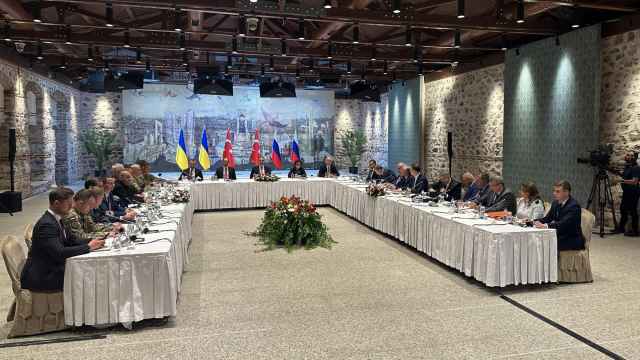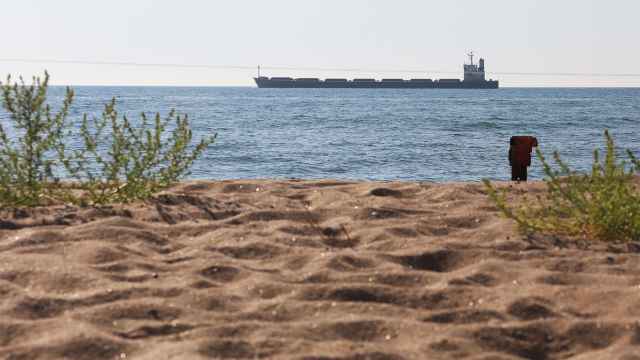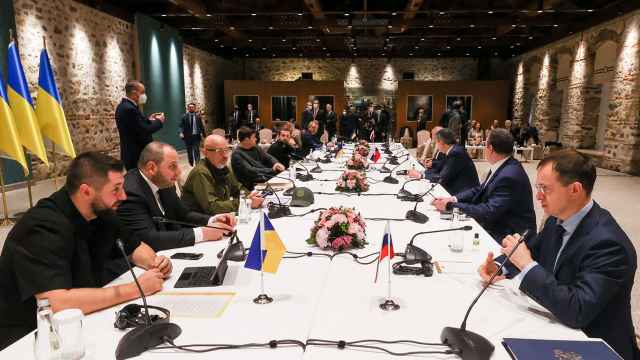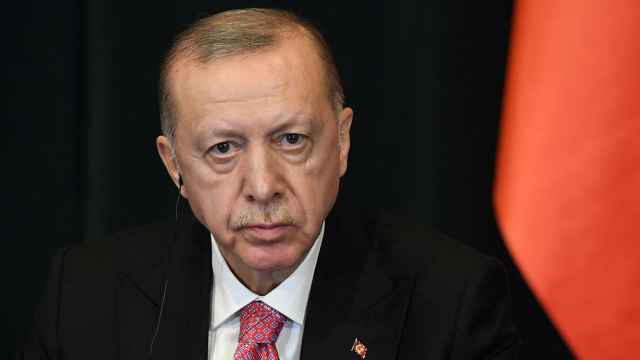Turkish President Recep Tayyip Erdogan called Saturday for a peaceful resolution of Ukraine's tensions with Russia based on respect of its territorial integrity.
Flanked by his Ukrainian counterpart Volodymyr Zelenskiy, Erdogan told reporters in Istanbul that Turkey aims "to ensure the Black Sea remains a sea of peace and cooperation" as U.S. warships were due to sail through Turkey's Bosphorus.
"We don't want an increase in tensions in our common region," Erdogan said.
"We believe that the current crisis must be settled by peaceful means on the basis of international law and respect for Ukraine's territorial integrity," the Turkish leader added.
Ukrainian and U.S. officials have expressed concern in recent days over the arrival of thousands of Russian soldiers and military equipment near eastern Ukraine where clashes have increased between pro-Russian separatists and Kiev's government forces in a conflict now several years old.
Turkey announced Friday the United States will soon send two warships through the Bosphorus to the Black Sea, which borders both Russia and Ukraine.
U.S. Navy ships routinely operate in the region in support of Ukraine.
Erdogan also said Turkey was ready to provide all forms of support aimed at settling the conflict and that it would refuse to recognise Russia's 2015 annexation of Crimea, which was part of Ukraine.
Zelensky said: "Turkey's support for re-establishing our territorial sovereignty is essential."
Turkey said the two U.S. warships would transit the Bosphorus in line with the Montreux convention.
The 1936 treaty guarantees free navigation for civilian ships through the Turkish strait. But states that do not share a Black Sea coastline must give two weeks notice before sending warships into the area and then keep them there for no more than 21 days.
In a phone call on Friday, Russian President Vladimir Putin urged his Turkish counterpart to protect the treaty at a time when questions have risen about the impact of a planned canal.
Analysts said the possible suspension of the treaty could facilitate access to the Black Sea of warships from non-coastal countries like the United States and other NATO member states, which Moscow frowns upon. Turkey is a NATO member.
A Message from The Moscow Times:
Dear readers,
We are facing unprecedented challenges. Russia's Prosecutor General's Office has designated The Moscow Times as an "undesirable" organization, criminalizing our work and putting our staff at risk of prosecution. This follows our earlier unjust labeling as a "foreign agent."
These actions are direct attempts to silence independent journalism in Russia. The authorities claim our work "discredits the decisions of the Russian leadership." We see things differently: we strive to provide accurate, unbiased reporting on Russia.
We, the journalists of The Moscow Times, refuse to be silenced. But to continue our work, we need your help.
Your support, no matter how small, makes a world of difference. If you can, please support us monthly starting from just $2. It's quick to set up, and every contribution makes a significant impact.
By supporting The Moscow Times, you're defending open, independent journalism in the face of repression. Thank you for standing with us.
Remind me later.






